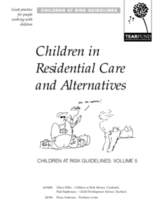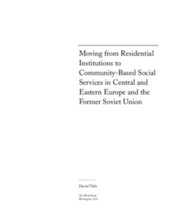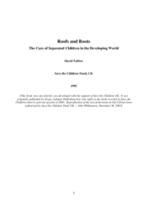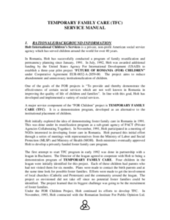Displaying 651 - 660 of 668
A series that provides a framework for good practice and guidelines for those who work in the area of child development policy. The series delves particularly into residential care and other alternatives of care and makes suggestions for reform by evaluating 6 case studies of good practice examples.
Country report of India on the situation of children in residential care in anticipation of the Second International Conference on Children and Residential Care: New Strategies for a New Millennium, to be held in Stockholm 12 – 15 May 2003.
The purpose of this report is to document the levels of child abandonment and de-institutionalization as an indicator of the quality of social transformation during the transition decade (1990-2000).
A paper describing a study that reviewed the role of institutional care in Albania, Armenia, Latvia, Lithuiania and Romania, where the World Bank worked to develop community based care social services and move away from large residential institutions that according to the paper have deleterious affects on the nations and on the people who live in them. Particularly, the study focuses on the use of residential institutions by children, people with disabilities and the frail and isolated elderly.
A summary of Ugandan child care and protection policies that have sought to de-institutionalize care, provide family tracing and re-unification, and improve community care.
Save the Children’s research and analysis of residential care services and the need for alternative non-institutional approaches for children separated from their families. This book examines policy and practices from work in Africa, Asia, Latin America and the Caribbean, and Eastern and Central Europe.
A manual for the establishment of foster care in Romania as an alternative to the institutional placement of children. Addresses the legal framework, policies, processes, responsibilities and administration surrounding creating and maintaining a foster care system.
As part of phase one of the development of the Martin James Foundation's Asia Care Network, comprehensive studies of the care system in each country were conducted to highlight the need for developing alternative care systems across South-East Asia. This case study highlights relevant data from Vietnam.
As part of phase one of the development of the Martin James Foundation's Asia Care Network, comprehensive studies of the care system in each country were conducted to highlight the need for developing alternative care systems across South-East Asia. This case study highlights relevant data from Malaysia.








